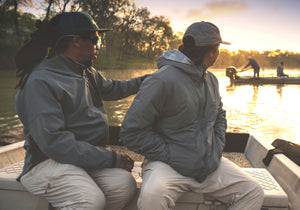Fly fishing, an activity deeply embedded in our cultural and natural heritage, transcends the mere act of fishing; it's a symbiotic relationship with nature, offering insights into the intricate balance of aquatic ecosystems. At Orvis, a pioneer in fly fishing equipment, there's a profound recognition of the need to safeguard these precious environments. In this article, we explore the seamless integration of fly fishing with conservation and sustainability practices, with a focus on ensuring that the treasures of our rivers and streams can be cherished and preserved for future anglers.
The Importance of Sustainable Fishing
Understanding the Ecosystem
Fly fishing is more than a sport; it’s a window into the complex web of life beneath the water's surface. Practising sustainable fishing helps in maintaining robust fish populations and balanced ecosystems. It's crucial for anglers to stay informed about local fish species, habitat needs, and ecological challenges.
Best Practices for Sustainable Fly Fishing
- Catch and Release: Emphasising the principle of catch and release is fundamental in sustainable fly fishing. This approach, when done correctly, helps in preserving fish stocks for future generations.
- Use of Barbless Hooks: Switching to barbless hooks is a simple yet effective way to reduce the harm to fish. These hooks are a testament to the angler's commitment to conservation.
- Awareness of Spawning Seasons: Knowledge of and respect for spawning seasons is critical. Avoiding fishing during these times safeguards the reproductive process and contributes to the health of fish populations.
Fly Fishing Conservation: A Collaborative Effort
Conservation in the realm of fly fishing demands collective action. It's a shared responsibility among anglers, organisations, communities, and industry leaders like Orvis.
Role of Fly Fishing Organisations
Fly fishing organisations are at the forefront of aquatic conservation. They spearhead initiatives for habitat preservation, pollution mitigation, and species protection. Engaging with these organisations helps amplify the impact of conservation efforts.
Community Involvement and Education
The strength of community involvement in conservation cannot be overstated. Local clubs and societies often spearhead initiatives like river clean-ups, educational workshops, and habitat restoration projects. Importantly, educating new and young anglers about sustainable practices sows the seeds for a conservation-minded future.
How Can Anglers Contribute to Conservation and Sustainability?
Practising Ethical Fishing
Ethical fishing embodies a respect for nature that goes beyond legal requirements. It's about mindful interaction with the aquatic environment, ensuring minimal impact on fish and habitat, and promoting the health of the waterways.
Supporting Conservation Projects
Fly fishermen can extend their impact by engaging in or financially supporting conservation projects. These efforts range from local stream restoration to advocating for environmentally sound fishing policies and funding scientific research.
Spreading Awareness
Awareness is a powerful conservation tool. Sharing insights and advocating for sustainable practices amongst the angling community fosters a culture of responsibility and stewardship.
Orvis: A Commitment to Conservation
Orvis's dedication to fly fishing extends far beyond providing top-notch equipment; it encompasses a deep-seated commitment to environmental stewardship.
Eco-Friendly Products
Orvis’s product line reflects its environmental ethos. From eco-conscious fishing gear to apparel, each product is designed with sustainability in mind, ensuring minimal ecological footprint.
Supporting Conservation Initiatives
Orvis’s active role in supporting conservation initiatives highlights its commitment to a greener future. Through partnerships with various organisations and direct involvement in conservation projects, Orvis sets a standard in corporate responsibility.

